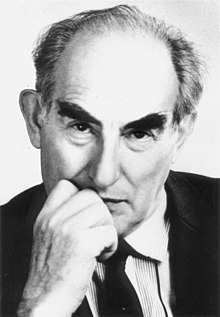Vitaly Ginzburg
Russian physicist (1916–2009)
Vitaly Lazarevich Ginzburg, ForMemRS[1] (Russian: Вита́лий Ла́заревич Ги́нзбург; October 4, 1916 – November 8, 2009) was a Soviet and Russian theoretical physicist, astrophysicist, and winner of the 2003 Nobel Prize in Physics. He was of Jewish descent.[2]
Vitaly Ginzburg | |
|---|---|
 | |
| Born | Vitaly Lazarevich Ginzburg October 4, 1916 |
| Died | November 8, 2009 (aged 93) |
| Nationality | Russia |
| Alma mater | Moscow State University |
| Known for | |
| Spouse(s) | Olga Zamsha Ginzburg (1937–1946; divorced; 1 child) Nina Yermakova Ginzburg (m. 1946) |
| Awards |
|
| Scientific career | |
| Fields | Theoretical Physics |
| Institutions | P. N. Lebedev Physical Institute, Russian Academy of Sciences |
| Doctoral advisor | Igor Tamm |
| Doctoral students | |
Ginzburg was a member of the Soviet and Russian Academies of Sciences and one of the fathers of the Soviet hydrogen bomb. He was the successor to Igor Tamm as head of the Department of Theoretical Physics of the Lebedev Physical Institute of the Russian Academy of Sciences (FIAN), and an outspoken atheist.[3]
Ginzburg died in Moscow on November 8, 2009 from cardiac arrest, aged 93.[4]
References
change- ↑ 1.0 1.1 Longair, M. S. (2011). "Vitaly Lazarevich Ginzburg. 4 October 1916 – 8 November 2009". Biographical Memoirs of Fellows of the Royal Society. 57: 129–146. doi:10.1098/rsbm.2011.0002. S2CID 71295700.
- ↑ "Nobelprize.org". Archived from the original on 2008-05-17. Retrieved 2017-03-31.
- ↑ Nikonov, Vyacheslav (September 30, 2004). "Physicists have nothing to do with miracles". Social Sciences (3): 148–150. Retrieved September 9, 2007.
- ↑ Thomas H. Maugh II (November 10, 2009). "Vitaly Ginzburg dies at 93; Nobel Prize-winning Russian physicist". Los Angeles Times.
Other websites
changeQuotations related to Vitaly Ginzburg at Wikiquote
- Vitaly L. Ginzburg Archived 2008-05-17 at the Wayback Machine, Autobiography in English at Nobelprize.org
- Ginzburg's homepage Archived 2007-09-27 at the Wayback Machine
- Curriculum Vitae
- Open letter to the President of the Russian Federation Vladimir V. Putin
- Obituary The Daily Telegraph 11 Nov 2009.
- Obituary The Independent November 14, 2009 (by Martin Childs).
- (in Russian) Biography
- (in Russian) Obituary